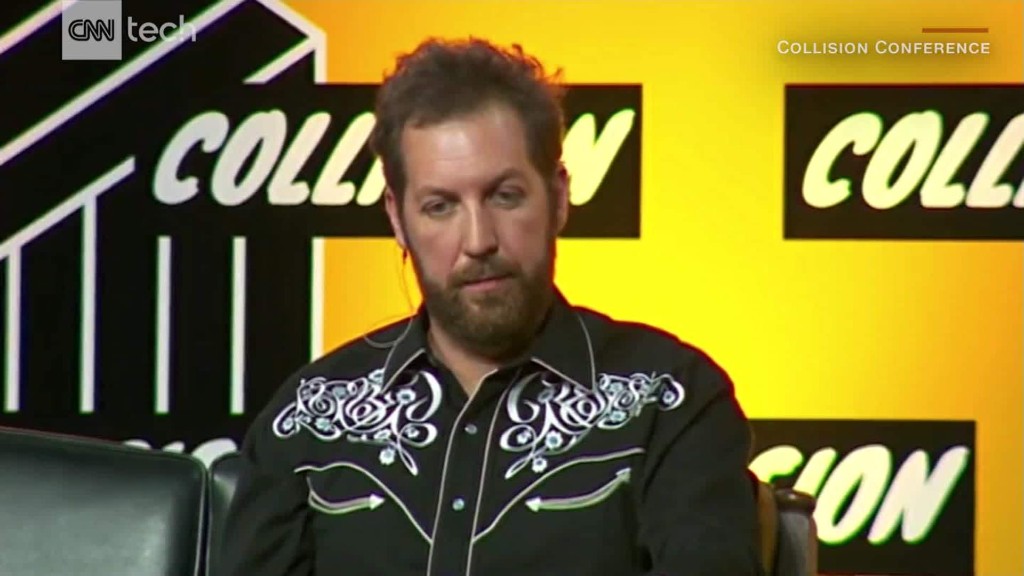
Travis Kalanick does give a damn 'bout his bad reputation.
Over the years, Uber's CEO has been described as arrogant and a "bro-y alpha-nerd" -- along with plenty of more colorful terms not fit to print here. And that was before Uber's endless string of PR crises kicked off this year.
But Kalanick disagrees with that perception.
"I think there's this general question out there: Is he an a**hole?" Kalanick says in Wild Ride, a book out this week offering an inside look at Uber's rapid rise. "I don't think I'm an a**hole. I'm pretty sure I'm not."
When asked if he cares about the negative public image, Kalanick says, "Yeah, it's not good for Uber, it's not good for me, it's not good for the people that I'm talking to. It's bad for everybody."
The conversation took place in July 2016. A little more than six months later, Kalanick would publicly admit he needs to "grow up" and get "leadership help" after a video surfaced of him arguing with an Uber driver.
The book, by Fortune executive editor Adam Lashinsky, offers a unique window into the background and psyche of the man shaping one of the world's most influential and controversial young technology companies.
Uber is both a startup juggernaut and a media punching bag. Kalanick, more than anyone, deserves credit for both. But contrary to the founding story Uber tells, Kalanick was not actually involved in the company's earliest days.
Garrett Camp, the serial entrepreneur behind StumbleUpon, came up with the idea in mid-2008 after getting "blacklisted" by the two big cab companies in San Francisco. Camp brought on Kalanick and three other friends as advisers. Kalanick took an interest in the idea, but he didn't join the company full time as CEO until 2010.
As an adviser and later the CEO, Kalanick did much to shape the service and the perception of it. For starters, he pushed Camp to move away from the idea of Uber owning cars. Kalanick also drove Uber's vast fundraising machine, which helped it outpace rivals.
Related: Uber's PR crises show no sign of letting up
But it was also Kalanick who brazenly talked up Uber's fights with regulators and "an a**hole named taxi." The aggressive rhetoric only helped create a bad boy image for him and the company.
In the book, Kalanick describes this as "little moments of arrogance where I say something provocative." He appears to see himself as a truth teller, however controversial the truth may be.
At least some of this posturing is said to go back to Kalanick's days of being picked on as a kid.
"I was geeky enough to get bullied. Not like physically beat up really, but just made fun of, ostracized," Kalanick recalls in the book. "That could be where the justice thing comes from."
Some have described Kalanick as a cutthroat libertarian who likely opposes government regulation, in part because he once used the cover of an Ayn Rand book for his Twitter profile image. Here, too, Kalanick feels misunderstood.
"There is this crazy meme on the Internet that I am some kind of Ayn Rand disciple," he says in the book. "A few years ago I read The Fountainhead and put it up as my avatar, not having any idea the political ramification."
If Uber's bad boy image wasn't bad enough, it has been hit with sexual harassment allegations this year. Much of the reporting for Wild Ride predates the allegations and doesn't offer any inside accounts of what happened.
However, Lashinsky does note that Kalanick's tech scene before joining Uber was "unapologetically male." In one old Twitter post, Kalanick brags about a Las Vegas rental he found "named the PIMP HOUSE, equipped with stripper pole AND stage."
The harassment allegations would be enough to rattle any company. But Uber is also facing a criminal probe over a tool it built to help drivers dodge law enforcement and is in the midst of a legal battle with Google's (GOOGL) Waymo that could hobble the future of its self-driving car operation.
Related: Uber searching for a COO after crises
Lyft, Uber's chief rival in the U.S., has differentiated itself with a friendlier brand and begun to capitalize on Uber's struggles. It recently raised $600 million in funding and said it experienced a 60% increase in new passenger signups the week after an Uber boycott in January.
If there is a saving grace for Kalanick based on the portrayal in this book, it's his ability to learn on the job, adjust quickly based on feedback -- and ultimately survive.
Kalanick taught himself how to fundraise with his first startup. He managed to get his second startup acquired even though he was the only employee left on staff at one point. And he steered Uber through new competition from Lyft and self-driving cars.
Now at Uber, Kalanick may just need to prove he can disrupt himself.

